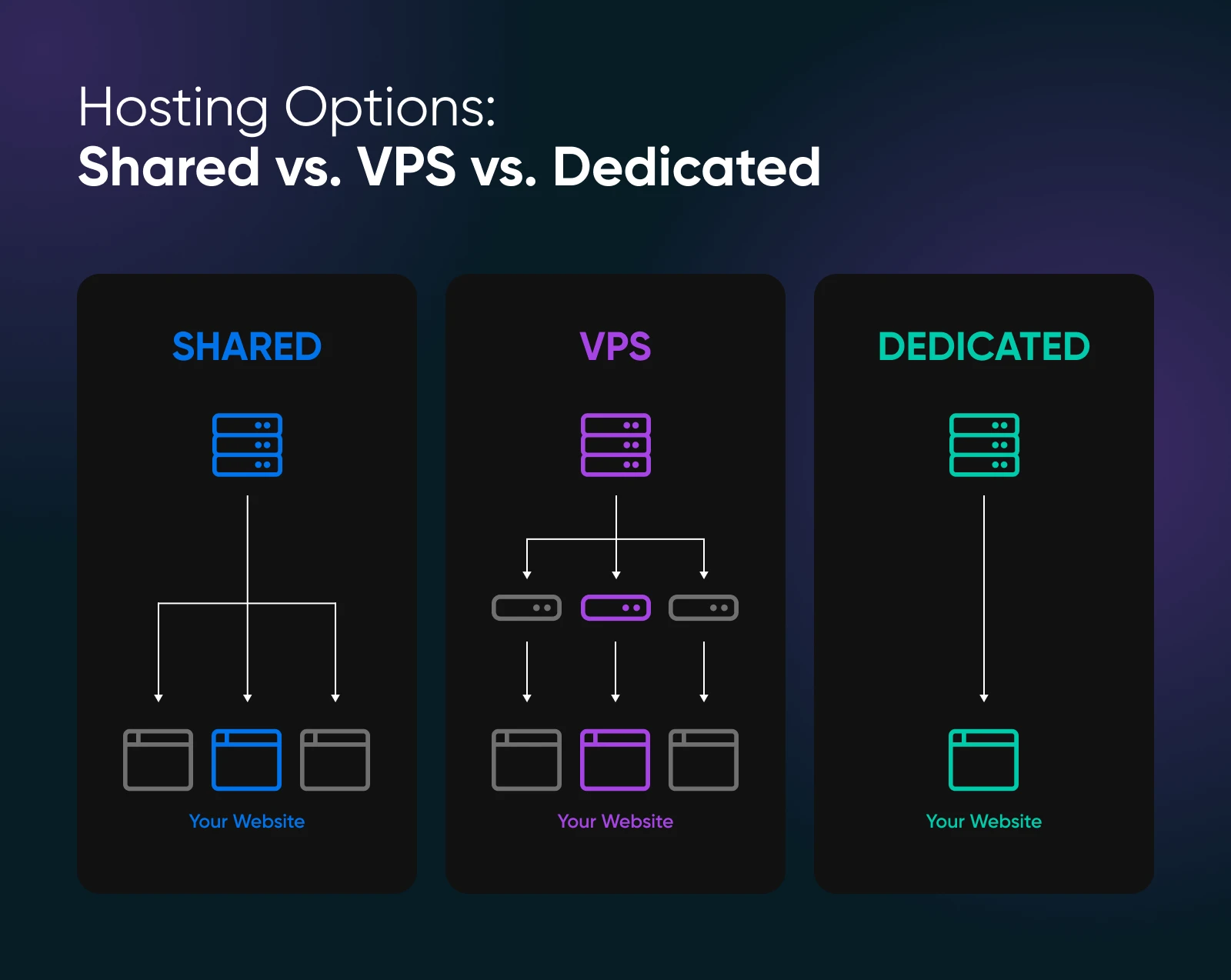Keywords, site speed, internal linking, and the quality of backlinks are just four of many factors impacting a website's ranking. However, one essential element is often sidelined—web hosting.
It may surprise you, but the choice of website host can determine whether your website ranks high in the SERPs or remains hidden in obscurity. After all, your web host affects various areas, including page load time and user experience.
If you are at a stage where you need to decide on the best hosting for SEO, this article will help you make the right choice.
Different Hosting Types: Shared, VPS, and Dedicated for SEO Benefits
Each hosting type affects a website differently and contributes to its search engine rankings. Here’s what makes them unique.
Shared Hosting
As touched on above, shared hosting is typically the go-to option for smaller sites due to its low-cost benefit.
Is Shared Hosting Bad for SEO?
Though shared hosting will exceed $72 billion in value by 2026, it poses various SEO risks because multiple sites compete for the same server resources. This setup resembles a neighborhood with houses drawing electricity from a single source, where when one house organizes a party, everyone else feels the power drain.
In other words, if one website on a shared server experiences high traffic, it can slow down other sites, dragging down your page load times. Slower pages lead to higher bounce rates, as users leave before content loads, which signals your site may provide a subpar experience.
In a shared environment, your website also shares an IP address with other sites, which can impact its SEO reputation. Search engines may penalize your IP if a neighboring site hosts spam or malicious content due to mere association.
Shared hosting plans also typically limit performance optimizations like server-side caching, which can otherwise accelerate load times. Without these optimizations, your site may struggle to meet speed benchmarks. As traffic scales, shared resources might not keep up, resulting in performance throttling as you near bandwidth limits, which further risks higher bounce rates.
VPS
VPS (Virtual Private Server) hosting combines shared server environments with dedicated resources using virtualization, creating a partitioned structure that isolates each site. While you share a physical server, your site benefits from its own space, ensuring stable performance even when neighboring sites experience high traffic.
This consistent speed helps retain users and reduce bounce rates, supporting SEO directly. Moreover, VPS hosting enables greater security because it isolates websites, lowering the risk of cross-site contamination.
Dedicated Hosting
This type of web host is the top choice for those focused on SEO, offering an exclusive server where you control all resources, configurations, and security. With dedicated hosting, your site manages high traffic without losing speed or performance, even during peak times.
Custom server optimizations reduce load times and foster positive user experience while eliminating resource competition, maximizing uptime, and strengthening security.
In a nutshell, the following factors should help you choose the best hosting for SEO:
- Shared Hosting: Cost-effective, shared resources, increased risk; best for small sites with minimal traffic.
- VPS Hosting: Balanced performance and security, isolated resources; suited for growing sites with mid-level traffic.
- Dedicated Hosting: Full control, premium performance, unmatched stability; perfect for large, high-traffic sites needing top SEO impact.

Key Features for Choosing the Best Web Hosting for SEO
When you’re choosing the best website hosting for SEO, keep in mind that this is more than just finding a fast and reliable provider. Research and understand hosting features as they influence how search engines interpret your site’s relevance, security, accessibility, and, ultimately, rankings.
Here’s what to consider when looking for web hosting that matches your needs and goals.
1. Server Speed
It should come as no surprise that 83 percent of users expect websites to load in no more than three seconds, as even a one-second delay in page load time reduces page views by 11 percent.
According to Littledata, your loading time should ideally be no more than 3.2 seconds to rank among the top 20 percent of websites. This explains why search engines prioritize fast server response, as not only do pages load quickly, but visitors also spend more time exploring them.
However, speed isn’t just about high-performance hardware. It’s about that hardware’s configuration. For example, SSD-based servers process data faster than traditional HDDs, resulting in quicker access to site content and less waiting for users.
Many hosts also employ caching layers that store static site elements, such as images or stylesheets, on the server. This allows reduced time in delivering key site features to users repeatedly, effectively slashing load times and lowering bounce rates.
2. Guaranteed Uptime
No site stays online 100 percent of the time, but the best hosts get quite close. Even a few minutes offline can halt user sessions and, potentially even worse, search engine crawls.
When websites go down frequently, crawlers may assume the site is unreliable and limit their visits, which means fewer pages indexed and lower visibility. Hosting providers offer uptime guarantees, typically 99.9 percent, which equates to less than nine hours of downtime a year.
Look for hosts with a transparent history of minimal downtime and consider those with service-level agreements (SLAs) that offer compensation if they fail to meet uptime targets. Thanks to this, search engines will mark your website as reputable, and you won’t have frustrated users who can’t access your site.
3. Server Location and Proximity to Target Audience
Website owners often overlook this fact, but server location impacts not only speed but also SEO effectiveness in specific regions. For instance, when your server sits in Canada, but most visitors are in Australia, data transfer slows down considerably. Relocating the server to Australia reduces response times and boosts page loading speed.
Hosting providers with data centers close to your target audience minimizes latency, translating into faster load times for local visitors.
Local speed boosts also ensure higher rankings in localized search results, helping your website gain visibility among nearby users.
If you cater to an international audience, look for hosts that offer Content Delivery Networks (CDNs). These distribute your content across various server locations worldwide and allow visitors from any region to access your content quickly and without lag, cementing greater SEO scores across global markets.
4. SSL Certification
Websites rely on SSL certificates to encrypt data and protect sensitive information, like passwords and payment details. This encryption reinforces security but also impacts SEO, as search engines like Google prioritize secure sites by giving them a ranking advantage.
SSL-enabled sites display HTTPS instead of HTTP, signaling to users and search engines that their data is secure. Most reputable hosting providers include SSL certificates in their packages, while some also offer advanced options, such as extended validation SSL, which further improves trustworthiness with more visible security markers.
5. Security Measures and Malware Protection
Websites face daily threats from hackers, malware, and other vulnerabilities. In 2023 alone, there were 2,365 reported cyberattacks. Hosting providers with strong security protocols protect your site from these risks and prevent penalties associated with hosting malicious content.
Prioritize hosts that offer active firewall protection, daily backups, and malware scanning within their security suite. Many providers also include DDoS protection to counter sudden traffic surges designed to slow or crash your site.
6. Scalability Options
As your website scales, its demand for server resources will grow. You’ll need a host offering seamless scalability to maintain stable performance during high-traffic periods.
Flexible plans, like cloud or VPS hosting, allow easy adjustments in server power, storage, and bandwidth, ensuring your site can handle traffic surges without slowdowns or interruptions. Scalability also supports introducing new content and features, which keeps user experience consistent as your site expands.
7. Dedicated IP Address
Unlike a shared IP, where multiple sites occupy the same address, a dedicated IP isolates your site, shielding it from potential issues caused by “bad neighbors” on the server. This separation improves site reliability, particularly during high traffic spikes, and reduces the risk of penalties if other sites on shared IPs engage in spammy practices.
Dedicated IPs also deliver faster response times, as users and crawlers can access your site directly without routing through shared resources, giving a measurable boost to SEO performance.
8. Backup and Recovery Plans
Backups protect your site against unexpected issues, such as server crashes, hacking, or accidental file deletion. A quality hosting provider offers regular, automated backups with efficient recovery options, allowing you to restore your site to a stable version in no time.
Some providers use incremental backups, saving only new changes to minimize server load and maintain speed. However, reliable backup solutions protect your content while helping prevent search engines from penalizing your site in the event of data loss or downtime.
9. Responsive Customer Support
Customer support may appear unrelated to SEO, yet a dependable support team greatly influences your website’s uptime and security. Prompt and knowledgeable assistance is a must-have during critical issues like downtime or security threats, as these can hamper your SEO performance.
Leading hosting providers offer 24/7 support through various channels, including live chat, phone, and email, while ensuring troubleshooting resources to address potential problems.
Conclusion
A bad website host is often a trouble waiting to happen. Multiple factors can impact your SEO ranking, meaning this isn’t a decision you should take lightly.
Instead, do your research, compare top-rated options, and go for the one that can deliver the best results. However, you may want to team up with professionals providing SEO services to help you find the best hosting for SEO and reach your objectives.
Check the following resources for more information on SEO and web development:





